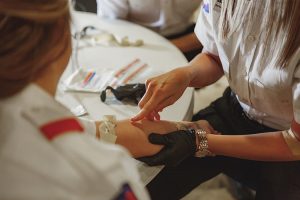(ABILENE, Texas) – Texas State Technical College is working to fill a need in Texas and the nation.
Ronnie Pitts, the statewide director of TSTC’s Emergency Medical Services program, said the need for paramedics is vital. TSTC will begin the next paramedic courses in Brownwood this fall.
“It has been difficult to fill the need for paramedics in Texas and nationwide,” Pitts said. “We just cannot turn them out fast enough.”
According to onetonline.org, the need for paramedics in Texas is expected to grow 11 percent by 2028.
To become a paramedic, a person must first be a certified emergency medical technician. The EMT certificate is a two-semester program at TSTC. The first semester covers the core EMT courses that allow students to sit for the National Registry certification exam. The second semester has online courses, including medical terminology, anatomy, and physiology.
For those who choose to continue, the four-semester paramedic program begins.
One of the paramedic program highlights is the final semester capstone, in which students are paired with a seasoned paramedic during an internship. When that is complete, students will be eligible to test for the National Registry paramedic certification.
Pitts said average annual salaries for paramedics vary across the state, from $30,660 in the Harlingen region to $31,750 in the Abilene region, according to onetonline.org. Austin-Round Rock has the highest average salary at $47,750. The statewide average salary is $35,940.
Many TSTC graduates have praised the program and the quality of its instructors, who have worked in the field.
“You know you are going to pass and make it through,” said John Hendrix, a 2020 graduate of the paramedic program. “The instructors make sure you are prepared to pass the National Registry. That is one of the best things about the program. The instructors want you to succeed.”
TSTC offers the EMS program in Abilene, Brownwood, and Harlingen. Students can use the latest technology during lab sessions and also work online to complete assignments.
“I did not realize we would have so much one-on-one time and be able to work with each other,” said current paramedic student Erik Duenes. “I knew there would be studying, but to come here on Wednesdays and execute what we have learned is the best part of the week.”
Pitts said the program aims to prepare paramedics with skills, and behavior to succeed.
“Our graduates are successful and are helping people on a daily basis,” he said.
For more information on the program, visit https://tstc.edu/programs/EmergencyMedicalServices.









